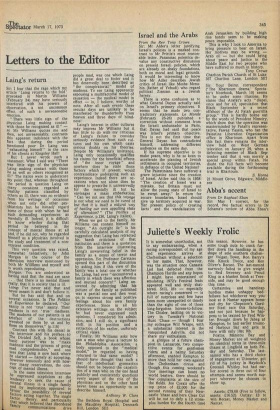Letters to the Editor
Laing's return
Sir: I fear that the rage which my article ' Laing returns to the fold ' provoked in Martin Williams (February 24) may have seriously interfered with his powers of observation, a not uncommon effect of such a unreasonable emotion.
"There was little sign of the physician Laing making contact with those he recognised as ill " — so Mr Williams quotes me and then, not unreasonably, contrasts this apparent indolence with the fact that during the period mentioned poor Dr Laing was " exhausting himself" in the care of his clients at Kingsley Hall!
But I never wrote such a statement. What I said was "There was little sign of the physician Laing making contact with those he as well as others recognised as ill," The italics were to underscore my point that, whereas throughout the period in question Laing on many occasions regarded as healthy patients classified by others as ill, there was no evidence from his writings of occasions when not only did other psychiatrists but he himself regard some of those with whom he had such demanding experiences as mentally ill. Indeed, it is difficult to know whether during that period he believed in the concept of mental illness at all and, if he did not, why he regarded himself as a physician involved in the study and treatment of a nonexistent condition.
This very question was raised, somewhat tentatively, by John Morgan in the course of the television interview mentioned by both Mr Williams and myself and is worth reproducing. Morgan: You are understood as having said that the mad are sane • • . that there is no mental illness really, that it is society that is ill. Laing: I've never said that and never meant it and don't believe it.
But he has said that and on several occasions. In The Politics of Experience he declared, "Our sanity is not ' true ' sanity. Their madness is not ' true' madness. The madness of our patients is an artefact of the destructions wreaked on them by us and by them on themselves." (p.118) Contrast this with his denial in the interview and his preface to The Divided Self, a book whose basic purpose was to "make madness and the process of going mad comprehensible," and one sees that Laing is now back where he started — namely at accepting, however tenuously and with however many reservations, the concept of mental illness. In the same television interview he expressed scepticism at the tendency to seek the cause of mental illness in a single family and by implication appeared to favour the possibility of several f_actors acting together. The single actor ctor theory, and particularly that which believed that disordered
family communications drive
people mad, was one which Laing did a great deal to foster and it has deservedly been described as "the conspiratorial" model of madness. To see Laing apparently espousing a multifactorial model of causation — the medical model in effect — is, I believe, worthy of note. After all such events these secular days are unlikely to be manifested by thunderbolts from heaven and three days of blindness!
Laing's interest in other cultures may impress Mr Williams but it has little to do with my criticism of Laing's failure to consider seriously evidence from such cul tures and his own which casts serious doubts on his theories.
Despite Mr Williams's insistence, Laing only occasionally qualifies his claims for the beneficial effects of "the inner voyage" and nowhere does he state those factors which if present would contraindicate undergoing such an experience. Indeed there are oc casions when not alone does he appear to prescribe it unreservedly for the mentally ill but he envisages a mass embarkation: "Can we not see that this voyage is not what we need to be cured of but that it is itself a natural way of healing our own appalling state of alienation? " (The Politics of Experience, p.136, Laing's italics). When we get to the family, Mr Williams can contain himself no longer. "An outright lie " is his carefully calculated analysis of my suggestion that Laing has retracted his harsh criticisms of that institution and there is a quotation from the interview illustrating Laing's unwavering belief in the family as a nexus of terror and oppression. Yet Professor Carstairs opened this part of the discussion by asking him if this view of the family was a total one or whether he, Laing, had ever "encountered a family in which there was affection and mutual concern?" Laing answered by admitting that his picture of the family as published was a partial one and then went on to express strong and positive feelings about his own family experiences. Since in all his extensive writings on the subject he had never expressed such opinions, I considered his admission, and I still do, a significant shift in his position and a retraction of his earlier, uniformly critical views.
Finally, Mr Williams asks how can a man who gives a lecture to the Philadelphia Association, a body opposed to the "medical model," be regarded as having returned to that same model? I should have thought that such a feat of intellectual gymnastics should not be beyond the capabilities of a man who on the one hand publicly and consistently questions every aspect of the role of the physician and on the other hand never loses an opportunity to so describe himself.
Anthony W. Clare The Bethlem Royal Hospital and the Maudsley Hospital, Denmark Hill, London SE5


































 Previous page
Previous page